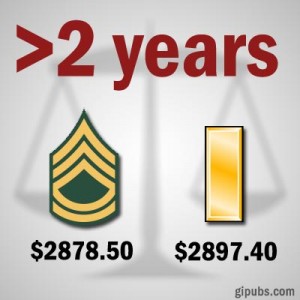The argument is as old as the service itself. NCOs are requesting their pay be raised to a rate comparable to officers. There are several factors to weigh when considering this issue: responsibilities, experience, and education just to name a few.
In the early 80’s I heard an officer explain that the difference between NCOs and officers was that officers had significantly more education than NCOs and that alone justified more pay for officers. Fast forward to today. The education gap has narrowed as more and more NCOs are college educated and in some cases have more education than senior officers. Does that mean NCOs deserve more pay?
Experience v. Liability

A 2011 pay scale comparison between an E-7 and 0-1 who has more than 2 years of service.
NCOs tend to argue they have years of field experience and their knowledge cannot be easily absorbed in a short about of time by officers with a few years of service. There is a lot to be said for this argument as education does not replace experience. NCOs tend to spend several years performing the same types of jobs while officers tend to rotate through a variety of positions to gain experience over a broad spectrum of assignments.
Responsibility, in my opinion, is key to this discussion. Officers (especially commanders) tend to be held absolutely accountable for everything that happens within their world influence while NCOs tend to be held to a significantly lower level of responsibility. This is to say that NCOs tend to be held accountable for things within their immediate control while a commander tends to be held responsible for the slightest infraction at the lowest level of command whether or not he had the ability to influence the situation or not. Let’s call it the burden of command.
It is also imperative for that each of us understand many enlisted personnel have the capability to become officers through OCS, ROTC, or in some case through attendance at military academies. The opportunities to gain a commission do exist. It’s up to enlisted Soldiers to make the decision and put in the effort if they have the desire.
Becoming an Officer also brings about significant change with regard to promotion potential and for that matter, the ability to retire. Officers tend to have tougher retention and promotion standards applied to them during times when the force is being reduced. While enlisted standards are also tightened during these times, more enlisted Soldiers appear to be capable of surviving these cuts.

Do NCO's deserve more pay?
As a retired senior NCO I can recall wanting to be paid for my experience yet I also believe there must be a significant separation in compensation to justify becoming an officer. I recall that Sergeant Major of the Army Jack Tilley, rallied to have E-9s paid at a rate comparable to a mid–grade Major. I believe his goal was admirable and did much to address the issue of responsibility and experience. It appears to be an approach that is realistic and provides a balanced solution to the issue.
I personally believe officers should be paid more because they tend to be held to a higher level of responsibility; their evaluation system appears to be far more subjective and is determined by their senior raters profile and how well you fit in with the rater/senior rater; while NCOs appear to have a more liberal opportunity with regard to evaluations and promotions. The difference in pay serves to motivate individuals to become officers. I think the answer to the question is fairly simple, if you are not satisfied with the amount of pay you receive you have a choice: become an officer or choose another career path. Most military members do not join the military to be paid well; they stay in the service because it becomes a way of life. American NCOs, by comparison with military services of other countries, are well paid and well cared for. If pay is the only thing that motivates you, military service is probably not your life long calling.
What do you think? Do NCO’s deserve more pay? Is the role of the non-commissioned officer changing?













